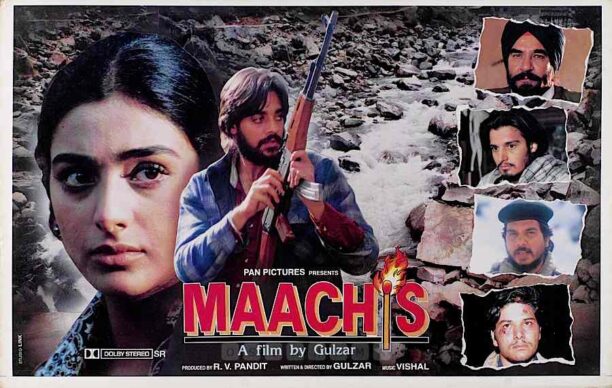 In this edition of Subhash K Jha terrific series, This Day That Year, he turns the focus on Gulzar’s period political drama, Maachis, that released in 1996.
In this edition of Subhash K Jha terrific series, This Day That Year, he turns the focus on Gulzar’s period political drama, Maachis, that released in 1996.
Long before cross-border terrorism there was the Khalistan movement in Punjab. Gulzar’s Maachis is a lean mean parable on militancy with an innocent Chandrachur Singh being sucked into Punjab militancy. The incandescent Tabu played his beloved who follows him into the darkness to spread her own radiance.
Who can forget Tabu emoting to Lata Mangeshkar immortal lines of homesickness ‘Paani pani re’? The song is anthem for all the youth who have strayed into militancy. Come back home.
Maachis was a very important film, not only for Gulzar who only directed one film (Hu-tu-tu) after Maachis in which the dots didn’t quite add up, but also for Indian cinema which tends to stay away from volatile sensitive political themes. Gulzar a Mona sardar, dared to dive into the darkness of terrorism in Punjab and the anguish it causes to the near and dear ones of those who get sucked into it.
With separatists again surfacing in hydra-headed aggression, perhaps it is time to revisit Gulzar’s Maachis again.
In an interview with this writer Gulzar Saab had said, “So many lives so many families get destroyed in the violence of separatism. My film Maachis on extremism in Punjab made a wide impact. I feel putting songs into it diminished the theme. The same happened with Hu-tu-tu. The subject gets diluted in this way. Cinema is so market-oriented; one can’t have full freedom to do what one wants to. Theatre offers a lot more freedom. Can film violence ever equal the brutality and impact of the real violence? Cinema holds up a mirror. Don’t expect it to reform society.”
Gulzar had words of high praise Tabu. “Like Jaya (Bhaduri) Tabu has ushered in an era of acting. She is not just unique she is also very intelligent and sensitive. I would say she is the best actress I’ve worked with.”
Maachis, Gulzar’s exceptionally observant look at militancy in Punjab in the 1980s post the assassination of Mrs Indira Gandhi, is disturbingly germane to contemporary politics. To those who actively participated in the violence against Sikhs in 1984, the film wags no accusatory finger.
Gulzar is not in the blame game. What he probes are wounds that never healed.
Today the movement for Khalistan seems to have moved westwards. As you watch Maachis again, you are struck by its supremely lucid structure. There are no superfluous moments in the melancholic movement of time and space . The narrative seems to move at its own volition even as Gulzar exercises a tight control over the narrative.
The semi-newcomers Chandrachur Singh, Jimmy Shergill, Ravi Gossain, and Suneel Sinha are on their own exploratory trip. But it is Tabu whose languid luminous presence instils that sense of lyricism and tragedy to the proceedings which lifts even the sagging moments, rare as they are. Watching her emote to Lataji’s ‘Paani paani re’, I again wondered if Tabu is the actress to best interpret Lataji’s voice after Nutan.
Vishal Bhardwaj’s music score is a highlight of Maachis. It creates room in the clenched political narrative. The songs ‘Paani paani re’, ‘Chhor aaye hum woh galiyan’, ‘Chappa chappa charkha chale’ and of course the undervalued gem ‘Tum gaye sab gaya’ sung to us about the heartbreaking tragedy of Punjab’s militancy.
The tragedy of a state lost in a politics of violence is reified in a strong reverberant narrative which never fights shy of breaking the rules. Maachis is as flawed and fractured as the politics that it tries to confront headlong in a script that is at once searching and mourning.









